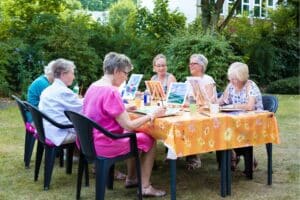Our bones are relied upon for a lot of hard work to support our bodies’ mobility, and bone health is essential for overall quality of life. But the truth is that our bones are among the most significantly altered body parts affected by the process of aging. Osteoporosis and arthritis weaken the bones, resulting in the potential for a variety of adverse outcomes like fractures, breaks, and falls that can lead to further damage to the body.
They can involve almost any part of the body, most often affecting the hip, knee, spine or other weight-bearing joints, but also found in the fingers and other non-weight-bearing joints. Some forms of arthritis can also affect other parts of the body.
- Six million Canadians are affected by arthritis.
- 1 in 4 women and 1 in 6 men
- By 2040, the number of Canadians with arthritis will reach a staggering 9 million, with significant impacts on individuals, families, and the healthcare system.
- More than half of seniors will have to contend with bone-related health issues.
- Twice as likely to struggle with mental health issues such as depression and anxiety
This can make everyday life uncomfortable, painful, and strenuous for seniors. Seniors are more than 5 times as likely to have difficulties with mobility – their ability to walk, climb steps, and care for themselves through activities like washing and dressing.
So, it is important to stay attentive in order to detect early warning signs. Prompt action should be taken to help avoid or minimize the impacts of bone diseases on seniors’ lives.
Osteoporosis and Arthritis
Osteoporosis and arthritis are among the most common bone diseases encountered by seniors, but it should be noted that the two are different from one another.
Osteoporosis generally weakens bones, making them highly susceptible to breaks as bone density decreases over time, leading to a breakdown of cartilage. Bone-on-bone contact can cause pain, stiffness, swelling and reduced range of movement. The joints most commonly affected by OA are the knees, hips and those in the hands and spine.
Arthritis is a more general condition that impacts the joints and tissues surrounding them. Inflammatory forms of arthritis are from inflammation instead of wearing away of the cartilage. Most forms of inflammatory arthritis are also autoimmune diseases, where the immune system – the body’s defense system against infections and other invaders – mistakenly starts to attack the body’s own healthy tissues.
Inflammation from these conditions can result in pain, stiffness, restricted mobility, fatigue and damage to joints and other tissues.
Both diseases impact the body in their own unique ways, creating different symptoms and outcomes. Several lifestyle choices and behavioural measures can be taken to attend to bone health to identify and protect against osteoporosis and arthritis.

Promoting Bone Health
Keeping seniors healthy and active to avoid bone diseases requires a combination of lifestyle changes and meetings with a healthcare professional to discuss risk factors or identify problems as promptly as possible.
Perform Tests
There are a whole host of medical tests that healthcare professionals can perform to build a more well-rounded picture of seniors’ current state of bone health and their chances of developing conditions that threaten their bones’ health.
Bone density testing involves a specific type of x-ray that is designed to measure the levels of calcium and other minerals within the bones. Testing for specific nutrients such as calcium or vitamin D through urine samples is also an option that can provide information regarding seniors’ bone health and their chances of experiencing a fracture.
Medication
Arthritis Medications: A Reference Guide is designed to help you make informed decisions about your treatment plan and enable you to ask your healthcare team specific questions related to your care.
Exercise
Strength training and other forms of exercise help to support overall health and can help keep bones strong. Daily stretching is also essential for keeping the joints and tendons around the bones limber and flexible.

Cut Out Unhealthy Habits
Most of us understand that behaviours such as smoking and drinking in excess negatively impact our health, but we might not all be aware that they can specifically impact our bones. Smoking and alcohol consumption both weaken bones by leaching out essential nutrients like calcium and magnesium. Seniors should stop smoking entirely and should try only to consume alcohol in moderation.
Eat Well
Eating a healthy diet made up of nutrient-rich foods can help strengthen the bones and protect against bone loss. Calcium, Vitamin D, and Magnesium are essential, so it can also be helpful to start taking supplements if enough of these essential nutrients are not being consumed through meals.
Know Your Risks
There are multiple risk factors for conditions like arthritis and osteoporosis, some of which are connected to lifestyle, others to biological features. Studies show that sex, ethnicity, family history, and age all factor into an individual’s chances of developing osteoporosis or arthritis, as do aspects of personal history such as experience with eating disorders. Meeting with a doctor or conducting self-directed research to determine what risk factors are present can help seniors understand their risk of bone diseases. It can help them understand what may have contributed to the development of these issues.
Establish a Plan
When working with seniors to plan out practical ways to attend to their needs, it is vital to make sure all areas of the body are given ample attention so that seniors can make healthy choices. This often involves implementing medications or treatments and living a lifestyle with the necessary knowledge about what is needed to maintain good health.
Knowing that bones are more likely to present challenges with age helps us understand the necessary measures to maintain bone health through healthy lifestyle choices. Also, appropriate medical testing, knowledge-building, and consultation with a healthcare professional can allow seniors in Kitchener-Waterloo-Cambridge to keep themselves and their bones in good shape even as they age.



